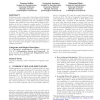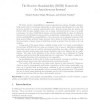66 search results - page 12 / 14 » On the Formal Modelling of Trust in Reputation-Based Systems |
110
click to vote
KCAP
2005
ACM
15 years 7 months ago
2005
ACM
User-centered consultation systems can be viewed as systems with trust in the competence of the user, whereas conventional knowledge systems are often based on some mistrust. By o...
135
Voted
SAC
2000
ACM
15 years 6 months ago
2000
ACM
Linda is a high level communication model which allows agents to communicate via a shared tuple spaces without knowing each other’s identities and without having to arrange for ...
119
Voted
GIS
2009
ACM
15 years 8 months ago
2009
ACM
Gazetteers are key components of georeferenced information systems, including applications such as Web-based mapping services. Existing gazetteers lack the capabilities to fully i...
116
click to vote
MOBILITY
2009
ACM
15 years 6 months ago
2009
ACM
Main requirement of recent computing environments, like mobile and then ubiquitous computing, is to adapt applications to context. On the other hand, access control generally trus...
143
click to vote
IANDC
2007
15 years 1 months ago
2007
We define reactive simulatability for general asynchronous systems. Roughly, simulatability means that a real system implements an ideal system (specification) in a way that pre...


